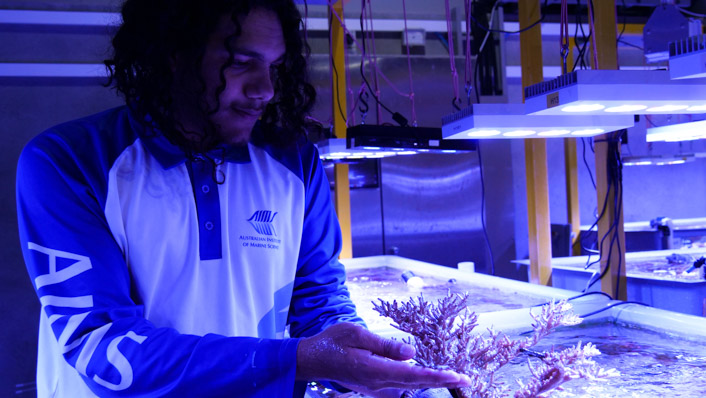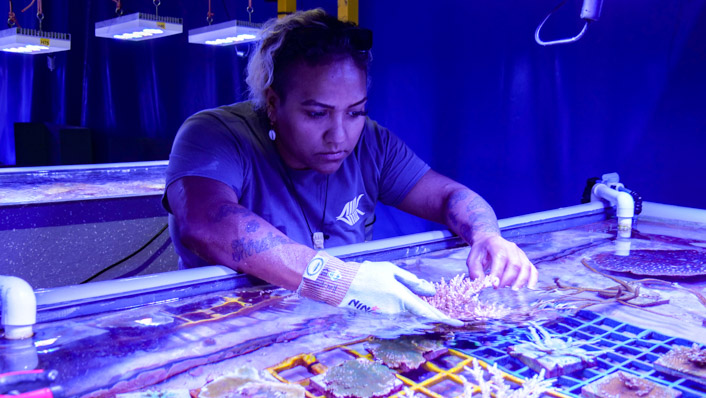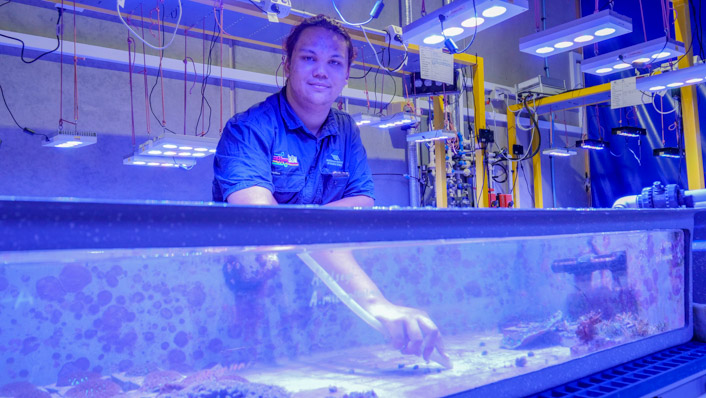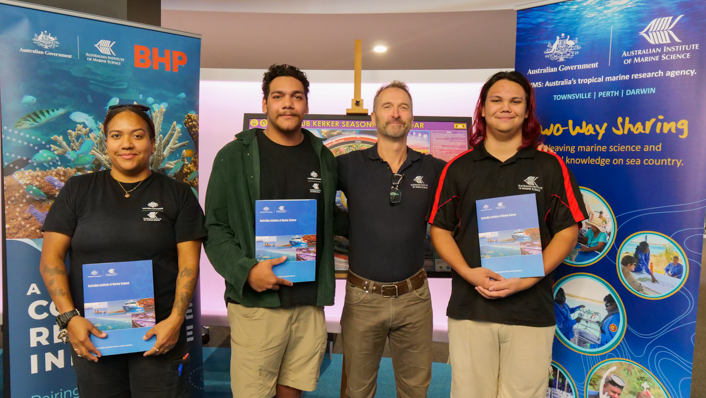Four Indigenous aquaculture trainees who have been honing their skills at the Australian Institute of Marine Science (AIMS) have successfully completed an inaugural two-year training course and are now expanding their skills with work placements at the Townsville headquarters.
Jamiga Cummins from Brisbane, Wahjtah Johnson from Townsville, Adam Napier from Bowen and Billie Homuk from Mount Isa graduated at a special ceremony at AIMS with Certificate IIIs in aquaculture.
Over the next 15 months they will round out their skills as aquaculture assistants rotating in AIMS' National Sea Simulator (SeaSim) and with other science teams, working on projects that are investigating the resilience, recovery and adaptation of corals under a warming climate.
Each of the graduates had differing levels of experience going into the traineeship, but all were amazed by the varieties and intricacies of the corals they studied and worked with.

Mr Johnson had studied for a Cert 2 in aquaculture at high school but had focused on barramundi.
"Working with corals was completely different, but I got a spark for this work with the Cert 2 and it has been amazing to immerse myself in coral husbandry in the SeaSim," he said.
"Working with the corals was a great way for me to connect back with Country because I grew up most of my life on Palm Island, so I was always near the water. Following this, seeing corals and having the opportunity to work on corals and even be involved in the spawning is amazing to me."
Mr Napier added: "I had no previous knowledge of corals so learning all about the different species and their names was mind-boggling."

Ms Cummins said: "Corals are such an incredible species. Understanding more the depth of the work being done to aid their survival whilst being a part of AIMS has been astonishing and I'm very thankful."
Some of the graduates had to leave their families and homes to move to Townsville for the program, which was an extra challenge on top of the work and study required.
Mr Napier, who began the program when he was just 18, said 'adulting' on his own for the first time in a new city while he was country boy fresh out of high school was hard, but moving away from home had helped him to mature.
"I'd really like to continue my studies in aquaculture and perhaps extend my knowledge into fish farming at some point," he said.

As a Woppaburra descendent, Ms Cummins had the opportunity to join a field trip during coral spawning to her sea Country in the Keppel Islands as part of the program.
"It was pretty powerful to be on sea Country for spawning and with the family. I was there with my nieces and younger family members. They immediately wanted to be involved, wanted to help. They wanted to learn what to do, so it was great to be able to explain the science to them, and perhaps inspire them to similar pathways."
AIMS CEO Dr Paul Hardisty congratulated each of the graduates and said the inaugural aquaculture trainee program was a key part of AIMS' goal to enhance its partnerships with Traditional Owners.
"Part of our commitment to knowledge sharing with our Traditional Owner partners is to provide training and job opportunities, and we were thrilled to host and guide our aquaculture trainees on their educational journey," he said.
"Jamiga, Wahtjah, Adam and Billie are the first cohort hopefully of many, and it's been two-way learning experience for us all. They've taught us so much about what's involved in running such a program and it's something which we intend to grow.
"This hands-on opportunity has clearly whetted their appetites for coral science, and we are excited to see how their skills and knowledge continue to develop in our state-of-the-art facilities under the expert mentorship of our staff, and beyond into other jobs in aquaculture."

Ms Cummins and Mr Johnson's roles were established in 2021 by the Woppaburra Coral Project, a program which is part of the Australian Coral Reef Resilience Initiative, a partnership between AIMS, BHP and Woppaburra Traditional Custodians.
The Woppaburra Coral Project is working in Woppaburra sea Country (in the Keppel Islands) and aims to establish coral seeding as a viable solution to reef restoration in Australia.
Mr Napier and Ms Homuk's roles were also established in 2021 by the Reef Restoration and Adaptation Program (RRAP). This program aims to help the Great Barrier Reef resist, adapt and recover, and is funded by a partnership between the Australian Government's Reef Trust and the Great Barrier Reef Foundation.






